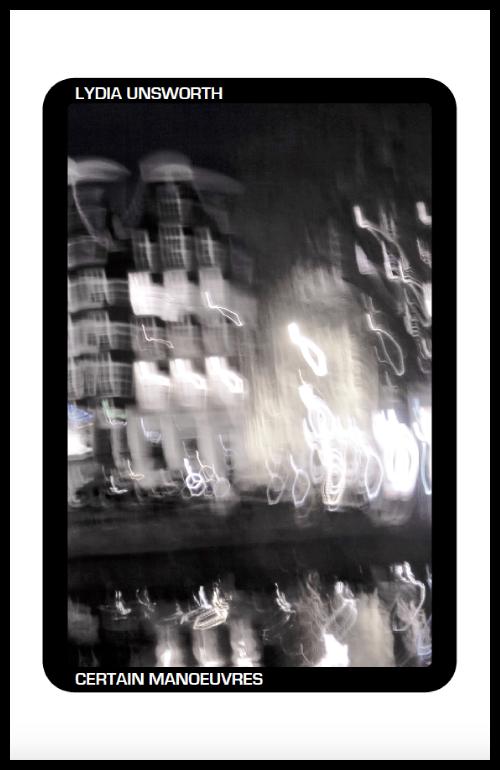Lydia Unsworth’s debut collection follows ‘you’ – sometimes ‘us’, or ‘me’, or ‘I’ – around Amsterdam: by foot, by bike, even hitchhiking, round and around in loops and spirals. Its speaker is plagued: by time; by water; by technology; by travel; by the phantom idea of home; by isolation. It is a constantly moving negotiation of space, simultaneously navigating the city and the internal geographies of anxiety and depression.
Partitioned by recurring titles, every other piece, ‘On’, seems to follow one character and is punctuated by ‘Master (stream), ‘Attachment’, ‘Effects’ and ‘’68’, which itself reprints excerpts of a 1968 Amsterdam guidebook from which cues are often taken: as the text, ‘the city-dweller likes to play tag with time’. Neither city-dweller nor tourist, the speaker seeks a ‘true-home place’ and longs for any kind of connection: ‘I try to smell like dead meat so the beetles come and sleep on me. I miss company’.
This is a bleak and lonely text, and the optimism offered by the ’68 guidebook becomes uncanny in being embedded into such a claustrophobic journey. The city’s layout dictates its navigation and ‘you follow the line of the water’ but ‘do not cross the canal’: rules manifest and repeat (‘you cycle the same way everyday’), and develop into more acute strains of obsession and fear: ‘I don’t put my hands in my mouth anymore because I don’t know where anyone else has been. Streptococcus lounging around the door handles, smoking and making eyes’. Phobias manifest phobias and despite longing for contact the character draws away from other humans, ultimately cowering from connection in order to hide from danger: ‘Home as a place with a reduced capacity for violence, where it is your choice to let the potential threats in by opening a window’.
But no matter where, the speaker’s ‘body parts are not integrated’, and the second person narrative enacts another layer of detachment: ‘as soon as a thing is seen from a distance it ceases to exist in the first person’. This might be an assertion of difference between Unsworth the writer and the speaker of the text, but depersonalisation disorder is also an acknowledged symptom of anxiety and is here exacerbated by technology: ‘you’d think, in this day and age, that there would be more connections. I hardly ever bring my hands and face to visit you anymore’. Yet it’s technology that’s always desperately clung to as possible cure, or at least distraction, so ‘you log onto anything within clicking distance’ and ‘You take a photo of something. You take a photo of something’.
This disconnect is also exercised through false equivalences, a kind of proof that nothing fits together cohesively. ‘The word for time is tide, the word for tide is tie, the word for tie is binding. The word for wait is one step away from the word for watch. Hour logging. The word for war, the word for ear, emphasis, a prostitute.’ These moments feel expansive: though seem the only real invitation for the reader to play with possibility, where linguistic material is foregrounded and might lead elsewhere than onward. But always the velocity of the work draws you back towards its narrative of denial, or being denied, because ‘each decision made is a small part of a larger negation’: ‘as soon as one thing is joined with another it becomes a different thing that is again just one’.
This repeated negation manifests a kind of all-pervading stasis: a preoccupation with the present born of a fear of time: its past and future, its passing now and the fear of it being squandered. But in the end ‘your efforts have been wasted’: what is sought is not found, and again only negation can balance: ‘you are better not at home than not away’ and you can’t lose by ‘both demanding and not demanding change’. Because ‘changing is too much, developing, being anything at all and all the time knowing it. You cannot imagine anything lasting, enduring, any kind of future’. It’s better to stay still, in the present as it ‘spreads out, hot butter’, because ‘This could by your only moment. This could be your only moment.’
Certain Manoeuvres is dimly lit, but there is light there. It may take a few reads to shine through, because reading it in one sitting can be a crushingly isolating experience. It’s ‘a hard day’s work, waiting to be somewhere else’, but once you take a step back and let the book rest, it becomes clear how every line and image is a necessary part of the text’s structure: ‘it’s about having a place to go, somewhere predictable’, and ‘cohesively distinguishing dark from light’ might be a process of finding peace in tumult, and opportunities for movement in stillness: ‘I like it when the oxygen lands on me. Rust in Dutch means peace.’
Jazmine Linklater has published the pamphlets Toward Passion According (Zarf, 2017) and Découper, Coller (Dock Road Press, 2018). She works for T-Junction International Poetry Festival and Carcanet Press, and co-organises the new experimental performance series No Matter in Manchester.

